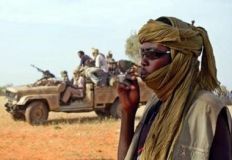AU blames rebel SLA for security deterioration in Darfur
Feb 2, 2006 (KHARTOUM) — The African Union said Thursday that security in Darfur was deteriorating, blaming a main rebel group for the most recent violence and reporting that the Janjaweed militia continued to cause havoc “on an ever-escalating scale.”
 Ambassador Baba Gana Kingibe, the AU special representative to the Sudan, outlined a series of violations between the warring sides since his last press briefing on Oct. 1 and condemned all sides for the abuses.
Ambassador Baba Gana Kingibe, the AU special representative to the Sudan, outlined a series of violations between the warring sides since his last press briefing on Oct. 1 and condemned all sides for the abuses.
“In many ways, insecurity in Darfur is more widespread, more intense, and more frequent on all fronts,” he said.
While noting an escalation of attacks and harassment of African Union and humanitarian personnel, Kingibe said there were fewer confrontations between the main three parties in peace talks – the government, the Sudan Liberation Army and the Justice and Equality Movement.
“This, I should acknowledge, is largely due to the restraint exercised by government forces, even in situations where they were clearly provoked,” he said.
He blamed the Sudan Liberation Army, Darfur’s main rebel movement, for the increase in violence at the end of January, saying they targeted both government forces and civilians in attacks that resulted in reprisal attacks by Janjaweed militia that caused further casualties.
“The major features of insecurity in Darfur became largely intertribal confrontations accentuated by the unrelenting activities of the Arab militias and opportunistic bandits,” he said.
Kingibe urged the government to take “immediate, vigorous and credible steps” to disarm the militias, which he said “still continue to burn, kill and rape on an ever-escalating scale” even without provocations from the SLA.
He condemned the atrocities on all sides and warned they could derail the ongoing peace talks in Abuja, Nigeria.
“The fine words of commitment to peaceful negotiations spoken by the parties in Abuja are not reflected by their belligerent deeds on the ground in Darfur,” he said.
An April 2004 cease-fire has been repeatedly violated by intermittent rebel attacks against the peacekeepers, civilians and humanitarian workers.
A statement issued Thursday by the AU Assessment Mission said the presence of African Union troops had helped to reduce violations of the fragile cease-fire between the Sudanese government and rebels, but acknowledged that the security situation still did not allow for the return of internally displaced persons and refugees in significant numbers.
The ambassador also blamed developments in Chad for introducing a new dimension to the already tense-situation in West Darfur.
He cited Chadian forces crossing into Sudan in pursuit of rebels, an AU patrol being obstructed by Chadian deserters and a report of an attack on government forces near Geneina, the capital of West Darfur state, “by several heavily armed men believed to be Chadians.”
The border between Sudan and Chad is tense and each country accuses the other of supporting rebel movements against them. Kingibe commended both governments for not allowing the border situation to escalate.
In Darfur, an estimated 300,000 people have died, mainly of hunger and disease, and some 2 million have been displaced since rebels from the region’s ethnic African population revolted three years ago, accusing the Arab-dominated government in Khartoum of discrimination and decades of neglect.
The government is widely alleged to have unleashed Arab militias, called Janjaweed, who carried out sweeping atrocities against ethnic African villagers. President Omar al-Bashir denies his government supports the Janjaweed.
(ST/AP)
